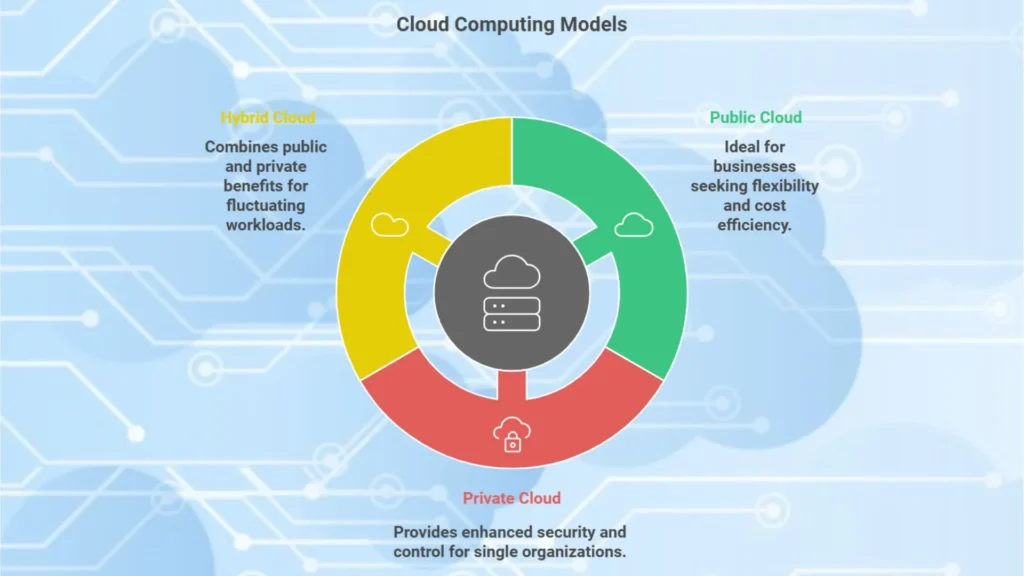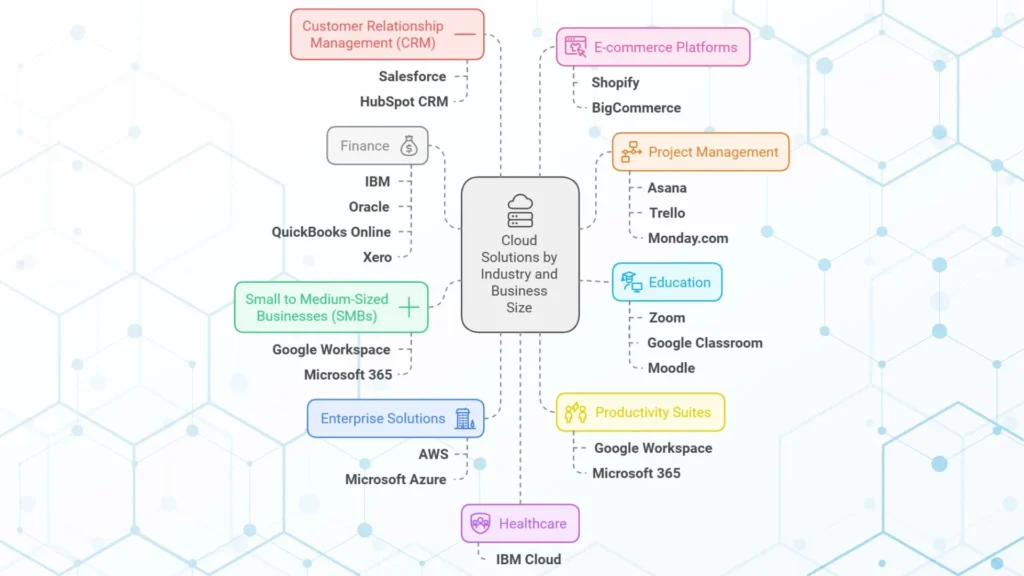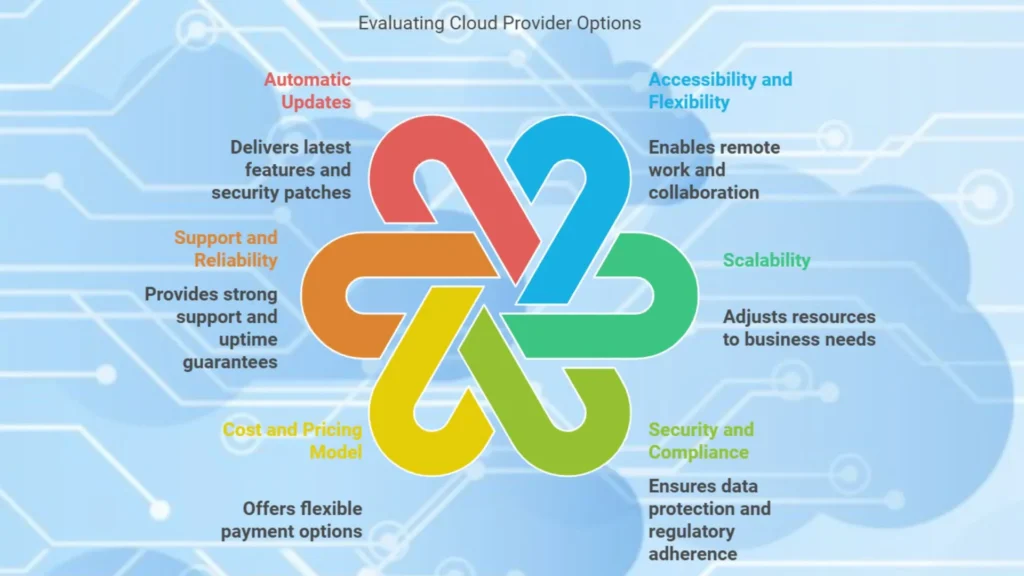Cloud computing has transformed the way businesses operate. There are scalable, flexible and cost effective solutions for cloud data storage, software applications and IT infrastructure. However, how to choose right cloud computing services for business remains a question. We need to evaluate various options and understand what each solution offers.
How does cloud computing benefit businesses? Here is a comprehensive guide to help you make the right decision.
Understand Different Cloud Computing Models
There are several primary models of cloud computing, each with advantages suitable to specific business needs. Here is a quick overview of the same:
Public Cloud:
In a public cloud, resources are shared across multiple users, which allows companies to scale resources up or down as per requirement. Providers like Amazon Web Services (AWS), Microsoft Azure and Google Cloud offer public cloud solutions ideal for businesses, who want flexibility and cost efficiency without managing their infrastructure.
Private Cloud:
A private cloud is dedicated to a single organization, which provide enhanced security and control over data and applications. Private clouds are particularly suited for industries with strict regulatory requirements, such as healthcare and finance.
Hybrid Cloud:
Combining public and private clouds, hybrid solutions allow businesses to maintain sensitive data on private servers while taking advantage of the scalability and cost savings of public cloud resources. This model is effective for businesses with fluctuating workloads and data that need both secure storage and scalability.

Popular Types of Cloud Solutions Based on Business Size and Industry Type:
Cloud computing requirements change by industry and company size, so it is essential to match solutions with specific operational goals and compliance requirements. Here is how different industries and business sizes benefit from suitable cloud solutions:
1. Small to Medium Sized Businesses (SMBs):
SMBs benefit from public cloud options such as Google Workspace and Microsoft 365, which offer cost effective storage and productivity tools. These solutions are scalable and allow SMBs to grow without investing heavily in physical infrastructure.
2. Enterprise Solutions:
Larger organizations with complex infrastructure often choose a combination of private and public cloud options to meet scalability and security needs. AWS and Microsoft Azure offer enterprise grade solutions, which support large scale applications with options for machine learning, data analytics and many more.
3. Project Management:
Tools like Asana, Trello and Monday.com enable teams to organize projects, track progress and streamline workflows across departments.
4. Productivity Suites:
Applications like Google Workspace and Microsoft 365 offer collaborative tools for document creation, spreadsheets and presentations. This enables seamless teamwork and project management.
5. Customer Relationship Management (CRM):
Salesforce and HubSpot CRM are powerful cloud based tools that allow businesses to manage customer data, interactions and sales processes.
6. Healthcare:
Healthcare organizations require secure, HIPAA compliant storage for sensitive patient data. E.g. Private and hybrid cloud solutions, like those offered by IBM Cloud.
Cloud applications enable secure storage of patient records, support telemedicine services and facilitate real time collaboration among healthcare providers.
7. Education:
Cloud based educational platforms like Zoom, Google Classroom and Moodle offer online learning environments, which allows students to learn remotely and access resources easily.
8. Finance:
Financial institutions handle high volumes of sensitive data and must comply with strict regulations. Private or hybrid cloud solutions with strong encryption and monitoring, such as those provided by IBM or Oracle, offer enhanced security and customization options tailored to finance.
Financial and Accounting Software like QuickBooks Online and Xero offer businesses cloud based accounting tools, which provide real time information into financial data with security and compliance features.
9. E-commerce Platforms:
Shopify and BigCommerce are cloud based platforms that help businesses to manage online stores, sales and customer data without the need for complex infrastructure.
10. Retail:
Cloud based point-of-sale (POS) systems streamline inventory management, sales and customer data, which enables retailers to provide a consistent customer experience across locations.

Key Criteria for Choosing a Cloud Provider
When evaluating cloud computing solutions, consider the following factors to ensure that they meet your operational and security needs:
1. Accessibility and Flexibility:
Cloud apps can be accessed from any device with an internet connection, which enables remote work and collaboration across time zones.
2. Scalability:
Look for a provider that can adjust resources according to your changing business requirements. This flexibility helps control costs and ensures efficient resource allocation.
3. Security and Compliance:
Data protection is critical, especially for industries subject to regulatory compliance. Choose providers that offer strong data encryption, multi factor authentication, backup, data recovery options and have compliance certifications (e.g., GDPR, HIPAA).
4. Cost and Pricing Model:
Cloud costs vary based on services and usage. Providers like Microsoft Azure offer “pay-as-you-go” pricing, which enables you to pay only for the resources used. Be sure to analyze your anticipated usage patterns to choose a provider with a pricing structure that matches your budget.
5. Support and Reliability:
Ensure that, the provider offers strong customer support and consistent uptime. Top providers like AWS and Google Cloud typically provide a Service Level Agreement (SLA) that guarantees a certain percentage of uptime, which is essential for businesses with high availability needs.
6. Automatic Updates:
Cloud providers frequently update applications, which ensures that users have the latest features and security patches without manual effort.

Real-World Examples of Cloud Success
Cloud computing has enabled many companies to enhance operations, improve alertness and reduce costs. Here are a few examples:
Netflix:
Netflix uses AWS’s extensive cloud infrastructure to scale its streaming services to millions of global users. The flexibility and scalability of AWS enable Netflix to manage high traffic and continuously improve its service.
Pfizer:
Pharmaceutical company Pfizer utilizes hybrid cloud solutions to manage sensitive data and streamline research and development. The cloud enables secure data sharing among research teams, which accelerates innovation and compliance in the healthcare sector.
Airbnb:
Airbnb uses Google Cloud for its data analytics and machine learning capabilities, which allows the company to analyze customer preferences and optimize services across global markets.
Conclusion
The cloud technology continues to evolve, and more businesses are adopting multi cloud and hybrid cloud strategies. This is done by integrating cloud apps with AI and machine learning to enhance data analytics and decision making. Cloud applications will continue to support remote work, mobile accessibility and the growing need for real time data processing. From productivity tools to industry specific solutions, cloud apps have transformed how we work, communicate and manage data.
Evaluate providers based on scalability, security and support. Choose the right cloud computing solution for your business’s specific needs and goals, which enhances productivity and provides a solid foundation for future growth.

